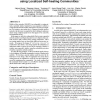Free Online Productivity Tools
i2Speak
i2Symbol
i2OCR
iTex2Img
iWeb2Print
iWeb2Shot
i2Type
iPdf2Split
iPdf2Merge
i2Bopomofo
i2Arabic
i2Style
i2Image
i2PDF
iLatex2Rtf
Sci2ools
MOBIHOC
2005
ACM
2005
ACM
A secure ad-hoc routing approach using localized self-healing communities
Mobile ad hoc networks (MANETs) are vulnerable to routing attacks, especially attacks launched by non-cooperative (selfish or compromised) network members and appear to be protocol compliant. For instance, since packet loss is common in mobile wireless networks, the adversary can exploit this fact by hiding its malicious intents using compliant packet losses that appear to be caused by environmental reasons. In this paper we study two routing attacks that use non-cooperative network members and disguised packet losses to deplete ad hoc network resources and to reduce ad hoc routing performance. These two routing attacks have not been fully addressed in previous research. We propose the design of "self-healing community" to counter these two attacks. Our design exploits the redundancy in deployment which is typical of most ad hoc networks; Namely, it counters non-cooperative attacks using the probabilistic presence of nearby cooperative network members. To realize the new par...
Ad Hoc Networks | Hoc Routing Performance | Hoc Routing Protocols | MOBIHOC 2005 | Wireless Networks |
| Added | 24 Dec 2009 |
| Updated | 24 Dec 2009 |
| Type | Conference |
| Year | 2005 |
| Where | MOBIHOC |
| Authors | Jiejun Kong, Xiaoyan Hong, Yunjung Yi, Joon-Sang Park, Jun Liu, Mario Gerla |
Comments (0)

